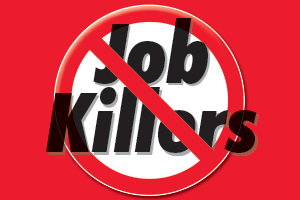 For years, employees have expressed their desire for the kind of workplace flexibility that would allow them to set a flexible daily schedule or alternative workweek. In fact, a recent survey conducted by the California Chamber of Commerce found that 91% of polled voters agree that the state’s labor laws should be changed to allow for more flexibility.
For years, employees have expressed their desire for the kind of workplace flexibility that would allow them to set a flexible daily schedule or alternative workweek. In fact, a recent survey conducted by the California Chamber of Commerce found that 91% of polled voters agree that the state’s labor laws should be changed to allow for more flexibility.
Yet rather than proposing a real solution that will meet workers’ and employers’ needs, California legislators are proposing a law that will dramatically raise labor costs, expose employers to litigation, and has the potential to kill hundreds of thousands of jobs — all under the false promise of giving employees more flexibility.
The bill, AB 2932 (Low; D-Campbell), redefines a workweek from 40 hours to 32 for employers with 500 or more employees, and lowers the weekly overtime threshold to 32 hours.
Of particular concern is that the bill’s language provides that “[t]he compensation rate of pay at 32 hours shall reflect the previous compensation rate of pay at 40 hours.” This language may be interpreted as requiring the employer to pay the employee the same total compensation that they are presently earning at 40 hours for 32 hours of work.
By way of example, an employee making $20 per hour presently makes $800 after 40 hours of work. Under AB 2932, they would be required to make $800 after just 32 hours of work, meaning their hourly rate would become $25 per hour, a 25% increase. If the employer needs the employee to work overtime, the pay rate (1.5 times $25 per hour) becomes $37.50 per hour. A business would be paying $37.50 for every hour worked on the fifth day, an 87.5% increase from $20 per hour.
This bill hits employers with a devastating Catch-22: employers must either find replacement workers to cover a fifth day of work to maintain operations in the midst of the Great Resignation shortage crisis or sustain large, across-the-board pay increases for existing workers after enduring more than two years of COVID-19-related closures.
Moreover, the bill’s requirement that employers not adjust an employee’s regular rate of pay is impossible to comply with and would expose employers to penalties under the Private Attorneys General Act (PAGA).
AB 2932 provides that “an employer shall not reduce an employee’s regular rate of pay as a result of this reduced hourly workweek requirement.” This is impossible to comply with because the regular rate of pay is not the base rate of pay set by the employer. It is a complex calculation that, for many employees, fluctuates from pay period to pay period. To calculate the regular rate of pay, an employer must include a number of different kinds of compensation, such as hourly earnings, commissions, and non-discretionary bonuses. If an employee earns a bonus for work performed in the prior month or quarter, the employer has to retroactively adjust the employee’s regular rate of pay for those prior pay periods.
The regular rate therefore fluctuates significantly depending on how much overtime an employee works and the performance or attendance bonuses or commissions they receive, much of which depends on the employee or general performance of the business in any given week, not factors solely under the employer’s control. That rate will inevitably be reduced in some pay periods compared to others. This bill in effect imposes steep PAGA penalties for violations that employers have no ability to correct.
In the pre-pandemic era, AB 2932 would have crippled employers, but in our current economic and shortage crisis, AB 2932 would decimate California’s businesses. A jobs impact analysis by Encina Advisors, LLC found that in a best case scenario, AB 2932 would result in more than 340,000 job losses—enough to raise California’s unemployment rate from 5.4% to 7.1%.
In the event that employers will have to pay overtime to employees working on their fifth day on top of increasing hourly rates, the research firm projects more than a million jobs will be lost.
The Legislature repeatedly fails to realize that businesses—even those with more than 500 employees—often operate on thin profit margins and the number of employees a business has does not dictate financial success. Many businesses have already scaled back their hours and operations as a result of increased costs and labor shortages. Undoubtedly, AB 2932 will result in reduced hours for workers in some instances, and in hundreds of thousands of other instances, workers will be left without a job.


